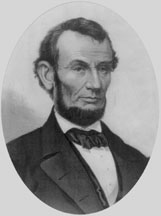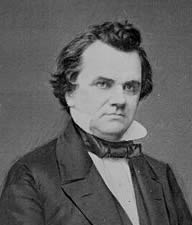This Week in History:
September 8 - 14, 1859
Lincoln Tells the Anti-Slavery Forces
How To Win the Fight
September 2013
 Abraham Lincoln
|
 Stephen Arnold Douglas
|
During the summer and fall of 1859, Sen. Stephen A. Douglas of Illinois was criss-crossing the states of the Midwest, trying to win people over to his doctrine of "popular sovereignty," and thus to weaken the resolve of those who opposed the spread of slavery. It was increasingly apparent that Douglas would be a Presidential candidate in 1860. Abraham Lincoln was also speaking to Midwestern voters, making crystal clear to them the basic policy questions the anti-slavery forces must resolve in their own minds before they would be capable of winning the upcoming Presidential election.
At this juncture, it was still not clear whether the new Republican Party would be joined by all the diverse anti-slavery factions, or whether there would be several anti-slavery tickets. Many people were talking of cobbling together some sort of compromise, while the "anti-Nebraska" Democrats, who did not want slavery extended, still rejoiced in the difficulties faced by the new Republican Party. In this fluid situation, Lincoln spoke at Columbus on Sept. 16 and then at Cincinnati on the following day.
Because Cincinnati was directly across the Ohio River from Kentucky, Lincoln adopted the device of first addressing his remarks to those who perhaps had crossed the river from Kentucky to hear him. He recommended that the Kentuckians, who were slightly suspicious of Douglas, vote for Douglas without reservation, for he was more in favor of establishing slavery on a permanent nationwide basis than they were. The purpose of this hilarious ironic discourse was to demonstrate to his audience exactly what ideological assumptions underlay the arguments used by Douglas to obscure his real purposes.
Among the many ways in which Douglas was softening up the Midwesterners was his Bible theory.
"In Kentucky, perhaps, in many of the Slave States certainly," said Lincoln, "you are trying to establish the rightfulness of Slavery by reference to the Bible. You are trying to show that slavery existed in the Bible times by Divine ordinance. Now Douglas is wiser than you, for your own benefit, upon that subject. Douglas knows that whenever you establish that Slavery was right by the Bible, it will occur that that Slavery was the Slavery of the white man—of men without reference to color—and he knows very well that you may entertain that idea in Kentucky as much as you please, but you will never win any Northern support upon it. He makes a wiser argument for you: he makes the argument that the slavery of the black man, the slavery of the man who has a skin of a different color from your own, is right. He thereby brings to your support Northern voters who could not for a moment be brought by your own argument of the Bible-right of slavery. Will you not give him credit for that? Will you not say that in this matter he is more wisely for you than you are for yourselves."
Lincoln then quoted from a Douglas speech at Memphis,
"where he declared that while in all contests between the Negro and the white man, he was for the white man, but that in all questions between the Negro and the crocodile he was for the Negro." Lincoln said that he supposed "that if a crocodile (or as we old Ohio River boatmen used to call them, alligators) should come across a white man, he would kill him if he could, and so he would a Negro. But what, at last, is this proposition? I believe it is a sort of proposition in proportion, which may be stated thus: As the Negro is to the white man, so is the crocodile to the Negro, and as the Negro may rightfully treat the crocodile as a beast or reptile, so the white man may rightfully treat the Negro as a beast or a reptile. [Applause.] That is really the 'knip' of all that argument of his."
"Now, my brother Kentuckians, who believe in this," said Lincoln, "you ought to thank Judge Douglas for having put that in a much more taking way than any of yourselves have done." [Applause.]
After cataloguing the sophisms used by Douglas, Lincoln turned to the necessity of organizing a principled stand against the policies which were destroying the nation.
"I have taken upon myself in the name of some of you to say, that we expect upon these principles to ultimately beat them [those who favored spreading slavery to every part of the nation]. In order to do so, I think we want and must have a national policy in regard to the institution of slavery, that acknowledges and deals with that institution as being wrong. [Loud cheering.] Whoever desires the prevention of the spread of slavery and the nationalization of that institution, yields all, when he yields to any policy that either recognizes slavery as being right, or as being an indifferent thing. Nothing will make you successful but setting up a policy which shall treat the thing as being wrong.
"When I say this, I do not mean to say that this general government is charged with the duty of redressing all wrongs which are wrongs to itself. This government is expressly charged with the duty of providing for the general welfare. We believe that the spreading out and perpetuity of the institution of slavery impairs the general welfare. We believe—nay, we know, that that is the only thing that has ever threatened the perpetuity of the Union itself. The only thing which has ever menaced the destruction of the government under which we live, is this very thing. To repress this thing, we think is providing for the general welfare. Our friends in Kentucky differ from us. We need not make our argument for them, but we who think it is wrong in all its relations, or in some of them at least, must decide as to our own actions, and our own course, upon our own judgment (emphasis added).
"I say that we must not interfere with the institution of slavery in the states where it exists, because the Constitution forbids it, and the general welfare does not require us to do so. We must not withhold an efficient fugitive slave law because the Constitution requires us, as I understand it, not to withhold such a law. But we must prevent the outspreading of the institution, because neither the Constitution nor general welfare requires us to extend it. We must prevent the revival of the African slave trade and the enacting by Congress of a territorial slave code. We must prevent each of these things being done by either Congresses or courts. The people of these United States are the rightful masters of both Congresses and courts [Applause] not to overthrow the Constitution, but to overthrow the men who pervert that Constitution. [Applause.]
"To do these things we must employ instrumentalities. We must hold conventions; we must adopt platforms if we conform to ordinary custom; we must nominate candidates, and we must carry elections. In all these things, I think that we ought to keep in view our real purpose, and in none do anything that stands adverse to our purpose. If we shall adopt a platform that fails to recognize or express our purpose, or elect a man that declares himself inimical to our purpose, we not only take nothing by our success, but we tacitly admit that we act upon no other principle than a desire to have 'the loaves and fishes,' by which, in the end our apparent success is really an injury to us.
"I know that it is very desirable with me, as with everybody else, that all the elements of the Opposition shall unite in the next Presidential election and in all future time. I am anxious that that should be, but there are things seriously to be considered in relation to that matter. If the terms can be arranged, I am in favor of the Union. But suppose we shall take up some man and put him upon one end or the other of the ticket, who declares himself against us in regard to the prevention of the spread of slavery—who turns up his nose and says he is tired of hearing anything about it, who is more against us than against the enemy, what will be the issue?
"Why he will get no slave states after all—he has tried that already until being beat is the rule for him. If we nominate him upon that ground, he will not carry a slave state; and not only so, but that portion of our men who are high strung upon the principle we really fight for, will not go for him, and he won't get a single electoral vote anywhere, except, perhaps, in the state of Maryland. There is no use in saying to us that we are stubborn and obstinate, because we won't do some such thing as this. We cannot do it."
"After saying this much, let me say a little on the other side. There are plenty of men in the slave states that are altogether good enough for me to be either President or Vice President, provided they will profess their sympathy with our purpose, and will place themselves on the ground that our men, upon principle, can vote for them. There are scores of them, good men in their character for intelligence and talent and integrity. If such a one will place himself upon the right ground I am for his occupying one place upon the next Republican or Opposition ticket. [Applause] I will heartily go for him.
"But, unless he does so place himself, I think it a matter of perfect nonsense to attempt to bring about a union upon any other basis; that if a union be made, the elements will scatter so that there can be no success for such a ticket, nor anything like success. The good old maxims of the Bible are applicable, and truly applicable to human affairs, and in this as in other things, we may say here that he who is not for us is against us; he who gathereth not with us scattereth. [Applause.]
"I should be glad to have some of the many good, and able, and noble men of the South to place themselves where we can confer upon them the high honor of an election upon one or the other end of our ticket. It would do my soul good to do that thing. It would enable us to teach them that inasmuch as we select one of their own number to carry out our principles, we are free from the charge that we mean more than we say.
"But, my friends I have detained you much longer than I expected to do. I believe I may do myself the compliment to say that you have stayed and heard me with great patience, for which I return you my most sincere thanks."
The original article was published in the EIR Online’s Electronic Intelligence Weekly, as part of an ongoing series on history, with a special emphasis on American history. We are reprinting and updating these articles now to assist our readers in understanding of the American System of Economy.
Related pages:
The Lincoln RevolutionAugust 25-31, 1856: Lincoln Campaigns for the Republican Party's First Presidential Bid
Feb. 3-9, 1865: The 13th Amendment: Lincoln Outlaws Slavery
October 14-20, 1854: Lincoln Exposes the Kansas-Nebraska Act as an Attack on the United States
August 12-18, 1858: Lincoln Debunks the Sophistry of Stephen Douglas
Feb. 26 - Mar. 3, 1860: Presidential Candidate Abraham Lincoln Makes His Principles Crystal-Clear
Dec. 26, 1862-Jan. 1, 1863: Abraham Lincoln's Emancipation Proclamation Goes Into Effect
Dec. 5-11, 1863: Lincoln's Proclamation of Amnesty and Reconstruction
